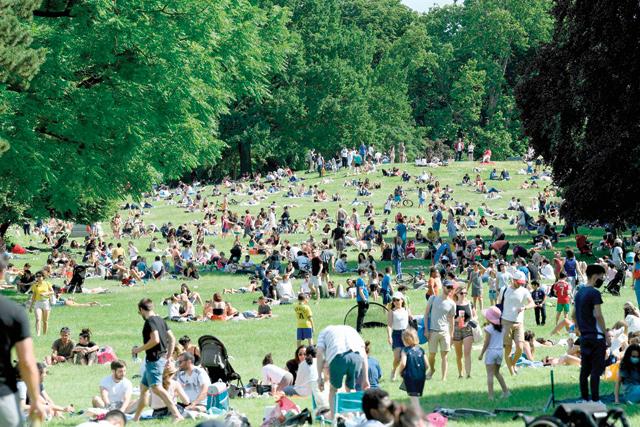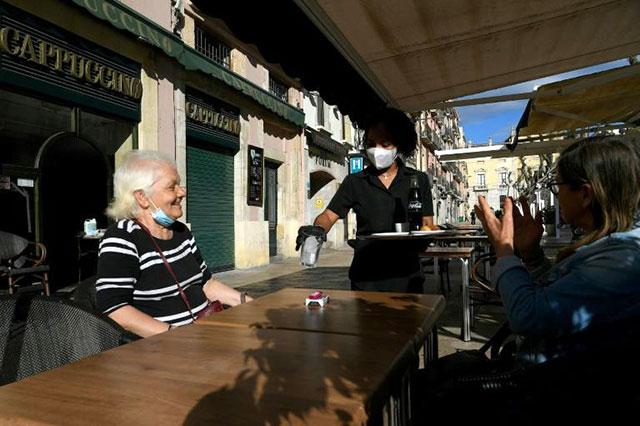You are here
'Back to life' on cafe terraces still a tiny COVID-19 risk: experts
May 06,2021 - Last updated at May 06,2021

French cafes and bars are set to reopen their terraces on May 19 (AFP photo by Ludovic Marin)
By Paul Ricard
Agence France-Presse
PARIS — A return to enjoying drinks with friends on a cafe terrace, so eagerly anticipated after seemingly interminable closures because of the COVID-19 pandemic, still poses a relatively small risk of contagion, experts warn, suggesting a variety of safeguards.
After months of on-again, off-again lockdown, many countries have reopened their bars or plan to do so soon.
Italians led the way in late April, followed by Greece on Monday, with France set to reopen its trademark sidewalk cafes on May 19.
Even with strict Covid safety measures in place, the reopenings are hugely symbolic for millions of people, holding out the hope of a return to normalcy just as spring ushers in warmer weather.
"I feel like I am living again, I've come back to life!" said Greek pensioner Andreas Riminiotis as Athens reopened on a sunny Monday.
But is it safe?
"The main message is still that [outdoor terraces] are far less risky than poorly ventilated interior spaces," epidemiologist Antoine Flahault told AFP.
Nearly 18 months after the start of the pandemic, experts agree that COVID-19 is largely transmitted through aerosols — tiny droplets that hang in the air.
They are produced "through infected people breathing, speaking, shouting or singing," said Flahault, head of the Institute of Global Health at the University of Geneva.
Overhanging clouds
"In a poorly ventilated space, an aerosol cloud can hang for several minutes or even hours before dissipating," he said. "But on the terrace, it dissipates rapidly into the atmosphere," he said likening it to cigarette smoke.
He estimated the risk at 18 to 20 times lower outdoors than in.
Still, Babak Javid, an infectious diseases expert at the University of California in San Francisco, said: "I do think bars, even outdoor terraces, are potentially problematic, and that's because those environments are associated with loud speech, people being close to each other, and, by definition, not wearing masks."
But he added: "Having said that, being outdoors will substantially reduce risks of transmission compared with indoors."
Behind closed doors, aerosols can remain dangerous for those sharing close quarters with an infected person, as the germs can be inhaled before they have a chance to dissipate.
Julian Tang, an expert in respiratory viruses at the UK's University of Leicester, agreed, saying: "It is the aerosols that are the main danger, especially those produced just by talking and breathing."
He added: "This is why distance between people is the most important factor, even outside, especially when you are eating and drinking and therefore cannot wear a mask."
In the long run, the best protection lies in the vaccines, he said.
"Universal COVID-19 vaccination will be the best way to reduce infections in this situation — as in all other situations."
In a study recently posted online, French researchers also noted a "short-range aerosol risk" and suggest the use of large fans.
"The more these fans induce turbulent fluctuations, rather than an average flow, the better they are," said the authors, who are students of experimental physics at the University of Paris.
They concluded that the risk varies with the direction of the wind and declines with distance from an infected person.
The study has been submitted for publication by the magazine Indoor Air, their supervisor Bruno Andreotti said on Twitter.
No sputtering please
Flahault mentioned another "theoretical risk", which he called the "direct contamination [or] ballistic route".
This could happen when an infected person "sputters while speaking, coughing or sneezing directly on the eyes, nostrils or mouth of the person across" the table a short distance away, who is not wearing a mask or glasses.
But he said this form of contagion is "more anecdotal than frequent".
Seeking to limit the risks, guidelines have been issued in various countries such as limiting the number of people at a table to six.
The authors of the French study said that besides giant fans, devices could be placed on individual tables that would suck in and filter out the ambient air.
Greece has a novel measure: banning music on the terrace, an idea that drew scorn from the opposition.
But experts say it may be well founded, since music requires people to speak more loudly, which turns up the volume of sputter and air-borne germs.
Related Articles
MOSCOW — Countries across Europe took bolder steps in easing coronavirus lockdowns, with schools, pubs, parks and pools reopening in places,
TARRAGONA, Spain — Spaniards returned to outdoor terraces at cafes and bars on Monday as around half of the country moved to the next phase
PARIS — The coronavirus pandemic has claimed more than 30,000 lives in Europe alone, a global tally showed on Wednesday, in what the head of



















